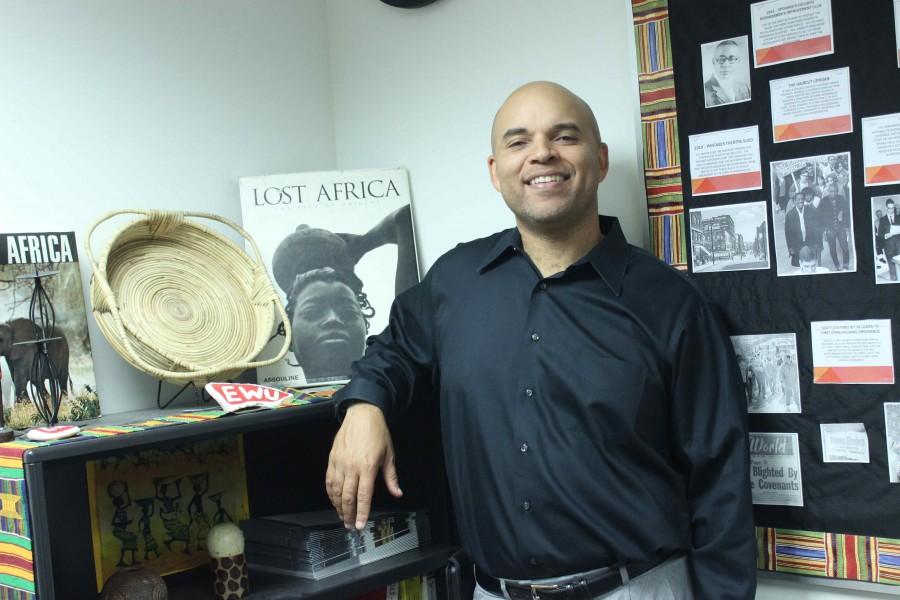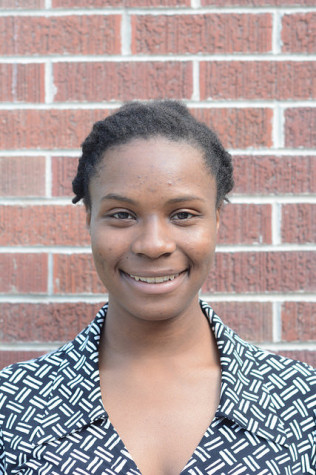Okera Nsombi joins EWU
Eastern’s new professor on Africana Studies and his own journey to self-acceptance
Okera Nsombi posing in his office.
November 5, 2015
“The ‘N’ is silent. It’s not as scary as it looks,” said Okera Nsombi, Ph.D., Eastern’s newest assistant professor of Africana Education-Instruction, as he explained the pronunciation of his name.
Nsombi is a young-looking, avuncular man with an almond complexion and closely cut hair. He greets students with a firm handshake and enthusiastic smile, but is not afraid of a friendly hug. And in the summer of 2015, his teaching career brought him over 2,500 miles from the palm and crescent of South Carolina to the Evergreen State, where he teaches African American History in lilting Southern tones.
Nsombi was born and raised in Columbia, S.C. until the age of sixteen.
“It felt like a perfect world … our family was so close,” said Nsombi, describing a close-knit family, tranquil home life, and Sunday afternoon family gatherings filled with cousins from his parents’ combined twenty siblings and homemade baked macaroni and cheese.
The world outside his home, however, was not so peaceful.
“Racial tensions were tough in South Carolina,” said Nsombi. “We had the race riots in school every year, blacks against whites.”
Nsombi particularly recalls one persistent instance of race-fuelled bullying that took place while he was in seventh grade.
“There was a guy that would sit on the bus everyday, and he would take his index finger and poke me in the back of the head all the way to school and call me a nigger, everyday … those things hurt,” Nsombi said.
According to Nsombi, his experience was typical of Black children growing up in the South during the 1970s, where many whites still resented the gains of the Civil Rights Movement, sported “rebel flags” and believed “Blacks were getting too many rights.”
The bullying did not improve in high school, and took a turn for the worse in his senior year, when his father moved the family from Columbia to Hebron, Kentucky, near Downtown Cincinnati, to live nearer to his work.
“[When he] signed us up for school—we didn’t realize there were only three black students in the school,” said Nsombi of a high school he estimates enrolled approximately 800 students at the time.
“The problem for me was not simply that there was a lack of diversity at the school,” he said. “It was the attitude that the white students had. I had never seen people that resented so much having black students at the school. So you’d have groups of guys that would get together, cut class, and come out and try to find myself or my brother or someone else, and they were asking for a fight. And there would be 15, 20 guys that would get together and do that.”
Raised in the tradition of Southern Hospitality, Nsombi initially tried to make friends in his new environment, “But those people up there…I have never heard the word ‘nigger’ so much in my life.”
For his part, Nsombi says the principal equated being called “nigger” to his own experience of being called “four-eyes” for his glasses as a child, dismissing the racial attacks as typical bullying.
“I was almost in a fight at that school every other week,” said Nsombi, who added that the only redeeming element of the racial prejudice was the assumption that he was a great fighter, and thus was rarely confronted one-on-one.
“They didn’t realize I had never been a fight before in my life, except with my brother,” said Nsombi.
The students were bold, however, in their verbal abuse. Yelling “nigger” from their lunch tables or from their cars as they drove past him on the street.
“It devastated me,” said Nsombi, who began crying himself to sleep every night. “That senior year was absolutely one of the worst things—probably the worst thing I ever experienced in my life.”
It was around this time that Nsombi, who had long enjoyed athletics, including basketball and baseball, began to fish more frequently. “That was my outlet,” Nsombi said, who still fishes today and can be seen tracking fishing tournaments online as he grades or meets with students in his Monroe office.
His last year in high school, Nsombi said there was no fellowship to be found among black students either.
“They didn’t know that I needed their support,” he said “They made fun of me because of my skin complexion being so white … That’s one of the consequences of living in a society where we still suffer from the effects of dealing with racism. It made me have more of a need to bond with people when I got to college.”
Amid the hostility of the Reagan-era South, Nsombi didn’t expect to live past his late teens, much less pursue higher education. He had internalized the racism of his environment, and genuinely believed that as a black man he was less intelligent than his white peers. Nevertheless, through the persistence of his father, Nsombi the went on to study sociology at Northern Kentucky University, where his love of African American studies was first ignited.
“I had never had a black teacher,” Nsombi said. “Never in my life. I didn’t know black people had Ph.D.s, I didn’t know there were Black professors … I didn’t know Black people wrote books with the exception of a few. I wasn’t exposed to those kinds of things. So when I got to college and saw a few Black professors dressed up in these suits … what it did was presented people to me that I could emulate.”
Nsombi began to take classes about the black experience. “I had never in my life heard anything like that…and it lit a fire in me that still is in me today …I thought, ‘people need to know this information.’ That’s what made me want to be a Black studies professor. It gave me a purpose in life,” he said.
Nsombi’s education experience at Northern Kentucky University stood in stark contrast to his schooling up until that point.
“I didn’t see any blacks in the books that we covered except maybe a paragraph or two about slavery,” said Nsombi. “And a few people maybe mentioned Rosa Parks.”
Nsombi said the lack of images of black people caused him a lot of confusion as he grew up. Unsure of his own identity, he said at times he desired to be white and said he believes many of his students have similar struggles today.
“I’ve had Black students tell me they wished that they were white … or they’ll talk about family members … who still have the desire to be like that today. That hasn’t gone anywhere because the basic structure of the school really hasn’t changed,” he said.
He went on to say, “My students still tell me they’re not taught anything in school [about Blacks], and if they are it was one class, or one teacher that went out of their way. And a lot of people don’t understand what kind of impact that has on kids … some kids come up to me and tell me that it really made them struggle with what it felt like to be identified as a Black person … Others have really attached themselves to some of the mainstream representation of what it means to be Black.”
Nsombi describes this mainstream image, comprised primarily of athletes, rappers and entertainers as “sometimes very detrimental.” While there are more images of Blacks in mainstream media, one result of those images is that in a predominantly white university, such as Eastern, the Black students are primarily represented on the sports teams, where they are expected to succeed.
Nsombi said he hopes to ameliorate the effects of inadequate representation as a professor. Plucked by Dr. Scott Finnie, Ph.D, from his duel adjunct positions at two different colleges in South Carolina, Nsombi said he believes his experiences both in predominantly Black and white universities has prepared him to reach out to Eastern students.
“Some people don’t seem to realize that resistance is a natural part of growing,” said Nsombi, who plans to remain compassionate and persistent. He also believes that cultivating relationships with students aids in teaching the material, and welcomes students to visit his office, seek his help or just “shoot the breeze” in his office.
Nsombi wants his students to know that Black Studies is comprised of more than just “Dr. King, and Rosa Parks, and Civil Rights, [and] ‘white people should feel guilty’ …”
In fact, Black studies envelopes several disciplines, including history, psychology and social work, complete with their own theorists and schools of thought.
“Black studies can actually augment your law degree, and produce someone like Michelle Alexander, who wrote ‘The New Jim Crow’ … My Ph.D. is in educational studies, but I took courses in Black studies, and that helped augment my degree in education.”
“Black studies is universal,” said Nsombi. “It’s interrelated and connected to all the other disciplines out there if it’s taught properly.”
As for his experience as a professor at Eastern, Nsombi said it has been quite positive, “Everyone’s so inviting and warm here. It feels good.”joi










JeLisa Ashby • Nov 22, 2016 at 10:15 am
Dr. Nsombi is an educator who further solidified my choice to become a teacher. I took his African American studies class at Claflin University back in 2010. It was my 2nd time taking the class (I had a different professor the first time). He may not know but he lit that same fire in me that he spoke of in this article. On top of his love for knowledge of self and his people he was a great teacher. He didn’t lecture we dialogued everyday. He asked thought provoking questions in a tone that you would hear at home or the barbershop. He would stop and talk to you on the yard. Not that I ever consciously felt that it was “uncool” but he made it cool to unapologetically be black. As I read (for the 3rd time), The Assassination of the Black Male Image, a book he assigned in his class, I wanted to reach out and thank him. I’m glad you are doing well.
-JeLisa Ashby an indebted student of yours